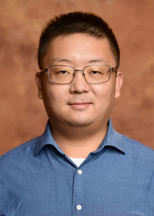IMPROVING DIELECTRIC INTERPRETATION BY CALIBRATING MATRIX PERMITTIVITY AND SOLVING DIELECTRIC MIXING LAWS WITH A NEW GRAPHICAL METHOD
Westside Houston
Speaker:
Seminar Date: Jun 09 2022
Registration Opens: May 13 2022 - Jun 09 2022
Time: 12:00 PM - 01:00 PM (US CDT)
Admission/Registration Link: None
Donation Link: None
Meeting/Webinar Link: https://register.gotowebinar.com/register/6911946130629461264
Contact: Andrew Hind (VP Downtown, SPWLA Houston Chapter)
Corresponding: vpdowntown@spwla-houston.org
Fees: FREENOTES:
Speaker : Haijing Wang (Chevron)
Date : Thursday, June 9, 2022
Time : 11:30 am – 1:00 pm (US CDT)
Venue : Geolog Americas, 10402 Valley Forge Dr., Houston TX 77042
Type : Virtual & In-Person
Admission : No cost for this seminar
Thanks to Geolog’s sponsorship
Parking Info : Complimentary parking garage at Geolog
In-person registration : At the end of this webpage
Virtual registration : https://register.gotowebinar.com/register/6911946130629461264
After registering, you will receive a confirmation email containing information.
Walk-ins are welcome but advanced registration is preferred. Please register by June 8th, 2022 @ 5pm to reserve lunch using the provided link.
Contact : Hyungjoo Lee (SPWLA Houston Chapter VP)
Corresponding : vpdowntown@spwla-houston.org
ABSTRACT:
Dielectric logging has evolved from a single-frequency mandrel tool in the 1970s to a multifrequency, fully articulated pad tool in the 2000s. Dielectric dispersion, the frequency-dependent dielectric property of sedimentary rocks, provides an additional dimension to petrophysical evaluation over broad frequency up to about 1 GHz. However, the interpretation of dielectric dispersion can be particularly difficult in organic-shale reservoirs, often due to a variety of polarization mechanisms and considerable uncertainties caused by complex mineralogy and organic matter. In this paper, we present an integrated workflow including dielectric core analysis, processing of dielectric-dispersion logs, and petrophysical interpretation through core-log integration. We emphasize the need for accurate matrix-permittivity determination for all current interpretation methods and explore the possibility to determine matrix permittivity directly from dielectric well logs. Dielectric core analysis is used to validate the interpretation model and calibrate dielectric well logs. For instance, matrix permittivity can be calibrated in the laboratory by optimizing the dielectric constant of each mineral and kerogen. This ensures that kerogen is lump summed with the matrix for more accurate estimation of hydrocarbon volume. Multifrequency dielectric well-log data are then fitted with an appropriate mixing law or dispersion model to obtain petrophysical parameters, such as water-filled porosity, salinity, textural information, and flushed-zone resistivity. Inspired by the Pickett plot as a visual representation of the Archie equation, we propose a new graphical method that we call Complex-Domain Analysis (CDA) to solve dielectric-mixing-law equations without having to know matrix permittivity. This new method provides a simple way to determine a uniform matrix permittivity or matrix-permittivity endpoints, directly from dielectric log without a need for calculating it from mineralogy, thus very useful for quality control and dielectric interpretation immediately after logging. The integrated dielectric interpretation workflow and CDA method are demonstrated in two case studies in organic-shale reservoirs.
BIOGRAPHY:
Haijing
Wang is a Senior Petrophysicist and Subsurface IP
Champion at Chevron Technical Center, a division of Chevron U.S.A. Inc. He was
a Postdoctoral Fellow at Lawrence Berkeley National Lab and UC-Berkeley prior
to Chevron. He obtained his PhD in Physics from the University of North
Carolina at Chapel Hill. Haijing has 5 granted US patents and 30+ publications
including several papers in Science and Nature Communications. He serves as an
Associate Editor for Petrophysics Journal and the Chairperson-Elect for SPE
Formation Evaluation Subcommittee. He was a recipient of several SPWLA
recognitions (Best of Petrophysics Paper 2018, Outstanding Petrophysics Paper
2020, Young Professional Technical Awards 2020, and Global Distinguished
Speaker 2021-2022), URTeC 2019 Best Paper Award, and Promising Professional
Achievement Award from the Society of Asian Scientists and Engineers.
